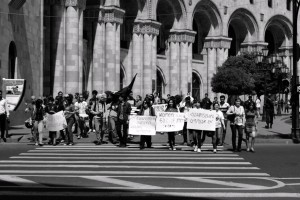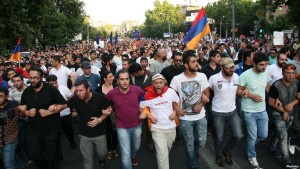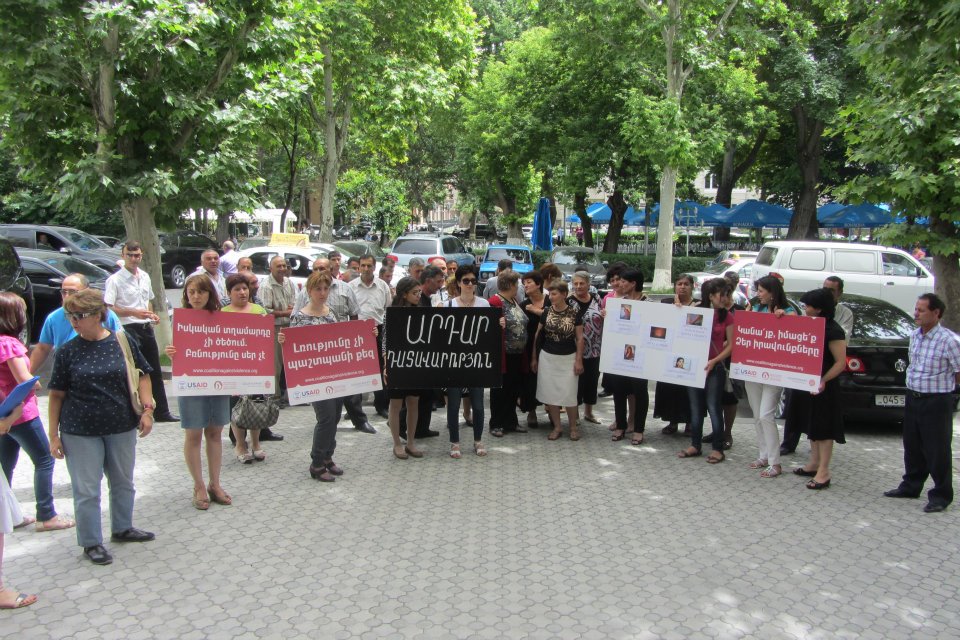Matosian: Be the Change You Want to See in Armenia
September 18, 2015Special for the Armenian Weekly
As descendants of Armenian Genocide survivors, many of us in the diaspora have built our identities and ideologies around the issue of demanding justice, truth, and reparations for this crime. As the Centennial approached, Armenians worldwide put forth the important question of what to do beyond April 24th, 2015. Many people spoke of continuing the global effort to gain justice for the genocide, while others emphasized renewed efforts to strengthen Armenia.

Women’s Resource Center participating in a demonstration for increased equality, Yerevan, 2013. (Photo: Svetlana Antonyan)
As I see it, we can continue to demand justice for the genocide and build Armenia, thereby helping our fellow men and women in a country that we call our own. Like all nations, we have a multitude of challenges. It would be shortsighted for a nation of people to focus on just one problem area. One does not and should not exclude the other. We need to come together collectively and decide what course we’re going to take and where we want to be 100 years from now.
And yet, we continue to witness a discourse on Armenia that is polarized. We often hear about all the wonderful new initiatives by diasporans in Armenia, including the TUMO enrichment center, Ayb School, Dilijan International School, IT start-ups, the American University of Armenia, and new diasporan and local-run establishments. But we also continue to hear of the difficult realities of corruption, poverty, depopulation, and a massive brain drain. So, are diasporans truly invested in building this nation? I believe that we certainly have room for improvement.
While various local organizations have done a tremendous job in building new institutions that are serving the local population and improving education, development, health, and other indicators, most are not challenging people’s underlying mindset and pushing them to tackle the fundamental problems that Armenia faces.
As global citizens, we know that few problems are unique to Armenia. Gender inequality, environmental degradation, lack of preservation of historic and natural sites, and widespread corruption are challenges facing the global community. For me personally, striving for social justice is both my biggest challenge and the beauty of living in Armenia. It brings me great fulfillment to know that the work I’m doing is making a difference in the lives of Armenian citizens every day.

Protesters took to the streets earlier this year under a “No to Corruption” banner, demanding the reversal of an electricity price hike. (Photo: Photolure)
I still vividly recall the early days of Armenia’s independence. On Sept. 21, 1991, the day of independence, I met a U.S. Senator at the presidential palace; he was as euphoric as I was. He told me that independence would change Armenia’s course and that we were fortunate to have such a strong collective identity and committed diaspora that would work to create change. But back then, no one quite knew the challenges that we were up against, as the country went through massive social and economic upheavals, the ripples of which are still evident today.
Twenty-four years after independence, after decades of subsisting on humanitarian aid, we are now at another crossroads. Building the nation-state has never been more important than now. For this, diasporans need to do more than write a check; we need commitment, determination, resilience, and sacrifice, keeping in mind that development is a continuous process.
So, who goes to Armenia? As someone who has lived and worked in the country on and off for the last 25 years, I can say that the repatriate community carries as much diversity as similarity. Some, like me, came with their entire families relatively early on and worked hard to assimilate when there was little precedent for making the move. Others arrived later, some independently and some with loved ones. Organizations like Birthright Armenia and various internship programs have brought hundreds of youth to Armenia and helped them to integrate into society and engage with local organizations.

Protesters against domestic violence during Mariam gevorgyan trial. (Photo: Society Without Violence in Armenia)
Despite the barriers to living and working in Armenia, including low wages and systems that are not fully developed to assist newcomers, more and more young, progressive diasporan Armenians are joining hands with activists in Armenia and contributing to the process of nation-building and social change.
I recently came across a profound and moving speech by U.S. President Obama on the eve of the 50th anniversary of the Selma shootings, in which he described the work of civil rights activists in America. In listening to the speech, I thought about the implications for Armenia and was reminded of the commendable work of diasporans who have worked to stop voting irregularities and have stood up for the rights of women, the LGBT community, and those with disabilities. I was also reminded of the challenges that my colleagues and I have faced—how we’ve been labeled, marginalized, and even threatened by those who resist the tides of change.
In listening to the speech, I thought about the implications for Armenia and was reminded of the commendable work of diasporans who have worked to stop voting irregularities and have stood up for the rights of women, the LGBT community, and those with disabilities. I was also reminded of the challenges that my colleagues and I have faced—how we’ve been labeled, marginalized, and even threatened by those who resist the tides of change.
Looking back now, we can say that significant progress has been made in America since the advent of the civil rights movement. But at the time, the outcome wasn’t so clear: Activists were condemned rather than praised, much like Armenian activists in today’s environment. In the words of President Obama, “What they did here will reverberate through the ages—not because the change they won was preordained, not because their victory was complete, but because they proved that nonviolent change is possible, that love and hope can conquer hate.”
Now is the time for us to rise up and demand justice. My hope is that future generations of Armenians can look back at this point in time and say that a major shift took place. We need to move away from humanitarian assistance models, and move toward finding solutions to the deeply ingrained societal norms that challenge progress.
Many older diasporans pessimistically hold onto the belief that nothing will change in Armenia—that it’s too corrupt and hopeless. But we are seeing young Armenians planting the seeds for the future. We have a responsibility to make Armenia a better place. We should not shy away from demanding accountability from our leaders. Next time you shake the hand of a government official, also point out the need to change policies and be serious about fighting corruption. We must become advocates for social justice and confront the deplorable corruption, gender inequality, discrimination of special populations, and other issues that are responsible for massive outmigration and difficult present-day conditions.
We must become advocates for social justice and confront the deplorable corruption, gender inequality, discrimination of special populations, and other issues that are responsible for massive outmigration and difficult present-day conditions.
I encourage all to come to Armenia and join forces with others who want to see a homeland that is more than just a place of beautiful historic sites and wonderful restaurants. Armenia is also a place where social justice and progressive thinking are advancing society. So-called “elitar” projects—those that cater to the best-and-brightest—often are limited in value, as they do not actually address the root problems of Armenia. We must build a strong civil society demanding accountability from the government.
Clearly fighting for justice for the genocide is just one of many battles we need to undertake. We also need to focus our energies on present-day struggles, and be the change we want to see in Armenia.
Maro Matosian is the executive director of the Women’s Support Center, Armenia. She can be reached at maro@womensupportcenter.org.
Source: Armenian Weekly
Link: Matosian: Be the Change You Want to See in Armenia